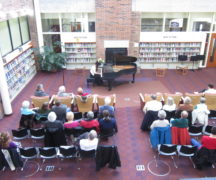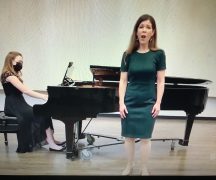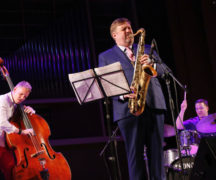Seldom does an opera arrive on the stage at Bowling Green State University with such high expectations.
“Cavalerria Rusticana,” which opens Friday at 8 p.m. with a matinee Sunday at 3 p.m. in Donnell Theatre, features native son Shawn Mathey who has already made his mark on international stages. And opposite his Turiddu as Santuzza is Jennifer Cresswell, who also has impressive professional stage credits, perfectly cast as the woman scorned.
The leads deliver, not just through voices that have the Donnell vibrating with their passion, but also through their acting, which brings their characters to life. It’s worth looking over at Cresswell during the scene in which her heart-to-heart talk with Turiddu is interrupted by Lola (Kyle Schreiber). Mathey’s character immediately abandons Santuzza as he dotes on the woman he had hoped to marry. Without a word, Cresswell expresses disdain both for her rival and her lover as well as self-pity for herself.
Santuzza had slept with Turiddu when he arrived back in his village to find Lola had married the teamster Alfio (John Mink). That dalliance had its desired effect, making Lola jealous, and she and Turiddu reunited. Tragedy ensues, all played out in full-throated singing.
Director Jesse Koza is able to place this sordid tale within the context of the village, albeit a village populated solely with young, good looking people. Central to village life is the trattoria run by Turiddu’s mother Lucia (Betsy Bellavia). With a few spare strokes, Koza sketches the sense of a community at once earthy and devout.
The play takes place at Easter, which sets the characters’ sins in stark relief. Santuzza, though, seems to be the only one who takes her sin to heart, and she stays outside the church, feeling herself unworthy, as the others enter. She is on the outs both with the village and with heaven.
This setting also gives composer Pietro Mascagni the chance to write some stately and very lovely religious music that contrasts with the songs of revelry and passion.
Mathey’s Turiddu is too besotted with his love for Lola to notice his own sin. Even as he fawns over Lola, his scenes with Santuzza reveal the lure of his lust for her.
The singing is supported by an orchestra, conducted by Emily Freeman Brown. The sound of the ensemble is rich with lower winds. The score has several passages where the orchestra comes to the forefront. When “Cavalleria” is paired as it often is with “Pagliacci,” these interludes are trimmed. Here they are heard in all their vibrant colors.
With no subplots, the narrative clips along to its tragic end. At about an hour, “Cavalleria” seems the perfect length to tell its tale.
Listeners drawn by the promise of high-powered voices will not be disappointed.
BGSU Opera Theater Gives Voice to Tragic Tale of Love





